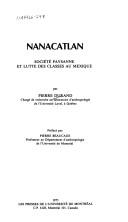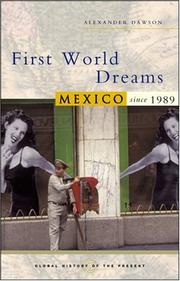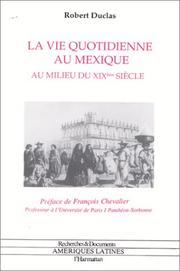| Listing 1 - 10 of 25 | << page >> |
Sort by
|
Book
Year: 1999 Publisher: Leamington Spa, UK : RISCT,
Abstract | Keywords | Export | Availability | Bookmark
 Loading...
Loading...Choose an application
- Reference Manager
- EndNote
- RefWorks (Direct export to RefWorks)
Book
ISBN: 0520015681 9780520015685 Year: 1970 Publisher: Berkeley (Calif.) : University of California press,
Abstract | Keywords | Export | Availability | Bookmark
 Loading...
Loading...Choose an application
- Reference Manager
- EndNote
- RefWorks (Direct export to RefWorks)
Poor --- Mexico --- Appropriations and expenditures --- Social conditions --- Poor - Mexico --- Mexico - Appropriations and expenditures --- Mexico - Social conditions
Book
ISBN: 1477304320 Year: 1968 Publisher: Austin, [Texas] : University of Texas Press,
Abstract | Keywords | Export | Availability | Bookmark
 Loading...
Loading...Choose an application
- Reference Manager
- EndNote
- RefWorks (Direct export to RefWorks)
One of the most interesting questions that can be raised about the twentieth century world concerns the degree to which industrialization created a common culture for all peoples. Reported here are the results of an empirical investigation designed to produce instruments to measure those personal values that have been central variables in the theory of modernization of societies. The purpose of Joseph Kahl’s research is primarily methodological: to advance the description and measurement of those value orientations used by men to organize their occupational careers. It seeks to delineate and measure a set of values that represents a “modern” view of work and life. The working laboratory was Brazil and Mexico, two countries undergoing rapid industrialization. More than six hundred men in Brazil and more than seven hundred in Mexico responded to questionnaires. In addition, over twenty-five men in each country were asked to sit beside a tape recorder and talk freely of their worldviews. The respondents were divided between inhabitants of the cities of Rio de Janeiro and Mexico City and those who lived in provincial towns of fewer than ten thousand inhabitants. The samples included manual and nonmanual employees. The results showed that the main variable predicting whether or not a man would tend toward modernism was his social-class position. Middle-class men were much more modern in outlook than working-class men. Residence in a metropolis rather than in a small town also increased modernism, though to a lesser extent. Differences between Brazil and Mexico (and, indeed, the United States) were found to be surprisingly small, of considerably less weight than position in the social structure in predicting value orientations. The author addresses himself primarily to sociologists and their students who are themselves studying aspects of socio-economic development. His findings, however, cannot fail to be of interest and benefit to social scientists of various disciplines and to all who are concerned with the process of development—planners at the national and local levels, demographers, and businesspeople.
Brazil-Social conditions-1964-1985-Case studies. --- Mexico-Social conditions-Case studies. --- Brazil --- Mexico --- Social conditions
Book
ISBN: 9781477304327 1477304320 9780292750197 9780292783546 Year: 2021 Publisher: Austin
Abstract | Keywords | Export | Availability | Bookmark
 Loading...
Loading...Choose an application
- Reference Manager
- EndNote
- RefWorks (Direct export to RefWorks)
One of the most interesting questions that can be raised about the twentieth century world concerns the degree to which industrialization created a common culture for all peoples. Reported here are the results of an empirical investigation designed to produce instruments to measure those personal values that have been central variables in the theory of modernization of societies. The purpose of Joseph Kahl’s research is primarily methodological: to advance the description and measurement of those value orientations used by men to organize their occupational careers. It seeks to delineate and measure a set of values that represents a “modern” view of work and life. The working laboratory was Brazil and Mexico, two countries undergoing rapid industrialization. More than six hundred men in Brazil and more than seven hundred in Mexico responded to questionnaires. In addition, over twenty-five men in each country were asked to sit beside a tape recorder and talk freely of their worldviews. The respondents were divided between inhabitants of the cities of Rio de Janeiro and Mexico City and those who lived in provincial towns of fewer than ten thousand inhabitants. The samples included manual and nonmanual employees. The results showed that the main variable predicting whether or not a man would tend toward modernism was his social-class position. Middle-class men were much more modern in outlook than working-class men. Residence in a metropolis rather than in a small town also increased modernism, though to a lesser extent. Differences between Brazil and Mexico (and, indeed, the United States) were found to be surprisingly small, of considerably less weight than position in the social structure in predicting value orientations. The author addresses himself primarily to sociologists and their students who are themselves studying aspects of socio-economic development. His findings, however, cannot fail to be of interest and benefit to social scientists of various disciplines and to all who are concerned with the process of development—planners at the national and local levels, demographers, and businesspeople.
Brazil-Social conditions-1964-1985-Case studies. --- Mexico-Social conditions-Case studies. --- Brazil --- Mexico --- Social conditions --- Social conditions

ISBN: 0840503008 9780840503008 Year: 1975 Publisher: Montréal: Presses de l'Université de Montréal,
Abstract | Keywords | Export | Availability | Bookmark
 Loading...
Loading...Choose an application
- Reference Manager
- EndNote
- RefWorks (Direct export to RefWorks)

ISBN: 9781842776605 1842776606 1842776614 9781842776612 Year: 2006 Publisher: London Zed
Abstract | Keywords | Export | Availability | Bookmark
 Loading...
Loading...Choose an application
- Reference Manager
- EndNote
- RefWorks (Direct export to RefWorks)
Democracy --- Human rights --- Mexico --- Social conditions --- Economic conditions --- Social change --- Economic conditions. Economic development --- Internal politics --- Democracy - Mexico --- Human rights - Mexico --- Mexico - Social conditions - 1970 --- -Mexico - Economic conditions - 1982-1994 --- Mexico - Economic conditions - 1994 --- -Social change

ISBN: 0804709971 0804711127 9780804711128 Year: 1979 Publisher: Stanford (Calif.): Stanford university
Abstract | Keywords | Export | Availability | Bookmark
 Loading...
Loading...Choose an application
- Reference Manager
- EndNote
- RefWorks (Direct export to RefWorks)
Indians of Mexico --- -Indians of Mexico --- -Peasantry --- -Indian criminals --- -Criminals, Indian --- Criminals --- Peasantry --- Agricultural laborers --- Rural population --- Marks (Medieval land tenure) --- Villeinage --- Indians of North America --- Indigenous peoples --- Meso-America --- Meso-American Indians --- Mesoamerica --- Mesoamerican Indians --- Pre-Columbian Indians --- Precolumbian Indians --- Ethnology --- Alcohol use --- Social conditions --- Mexico --- Social conditions. --- Indian criminals --- Peasants --- Alcohol use. --- -Alcohol use --- Criminals, Indian --- Indians of Mexico - Social conditions --- Indians of Mexico - Alcohol use --- Indian criminals - Mexico --- Peasants - Mexico --- Mexico - Social conditions
Book
ISBN: 0804778256 0804778264 0804782547 9780804782548 9780804778251 9780804778268 Year: 2012 Publisher: Stanford, Calif. Stanford University Press
Abstract | Keywords | Export | Availability | Bookmark
 Loading...
Loading...Choose an application
- Reference Manager
- EndNote
- RefWorks (Direct export to RefWorks)
With the failure of market reform to generate sustained growth in many countries of the Global South, poverty reduction has become an urgent moral and political issue in the last several decades. In practice, considerable research shows that high levels of inequality are likely to produce high levels of criminal and political violence. On the road to development, states cannot but grapple with the challenges posed by poverty and wealth distribution. Social Forces and States explains the reasons behind distinct distributional and poverty outcomes in three countries: South Korea...
Chile - Economic conditions. --- Chile -- Economic conditions. --- Chile - Social conditions. --- Chile -- Social conditions. --- Equality. --- Equality -- Case studies. --- Korea (South) - Economic conditions. --- Korea (South) -- Economic conditions. --- Korea (South) - Social conditions. --- Korea (South) -- Social conditions. --- Mexico - Economic conditions. --- Mexico -- Economic conditions. --- Mexico - Social conditions. --- Mexico -- Social conditions. --- Poverty. --- Poverty -- Case studies. --- Poverty --- Equality --- Business & Economics --- Economic History --- Korea (South) --- Chile --- Mexico --- Social conditions. --- Economic conditions. --- Egalitarianism --- Inequality --- Social equality --- Social inequality --- Destitution --- Political science --- Sociology --- Democracy --- Liberty --- Wealth --- Basic needs --- Begging --- Poor --- Subsistence economy
Book
ISBN: 2870271859 9782870271858 Year: 1986 Volume: 21 Publisher: Bruxelles Complexe
Abstract | Keywords | Export | Availability | Bookmark
 Loading...
Loading...Choose an application
- Reference Manager
- EndNote
- RefWorks (Direct export to RefWorks)
Amerika --- Amérique --- Anthropologie socio-culturelle --- Maatschappij --- Politiek --- Politique --- Socio-culturele antropologie --- Société --- Population --- Mexico --- Mexique --- Social conditions --- Conditions sociales --- -Mexico --- -Social conditions --- Population. --- -Population --- Meksiko --- Stany Zjednoczone Meksyku --- Meksyk --- Estados Unidos Mexicanos --- Meḳsiḳe --- Mexique (Country) --- Messico --- Méjico --- República Mexicana --- United States of Mexico --- United Mexican States --- Anáhuac --- メキシコ --- Mekishiko --- מקסיקו --- Mexique--Population--Guides --- Mexico--Politiek en regering--Gidsen --- Mexico--Bevolking--Gidsen --- Mexique--Politique et gouvernement--Guides --- large public ; guide et étude d'un pays dans ses confrontations sociales et politiques --- Mexico - - Population --- Mexico - - Social conditions - - 1970 --- -Mexico - Social conditions - 1970

ISBN: 2738416187 9782738416186 Year: 1993 Publisher: Paris Harmattan
Abstract | Keywords | Export | Availability | Bookmark
 Loading...
Loading...Choose an application
- Reference Manager
- EndNote
- RefWorks (Direct export to RefWorks)
History of civilization --- anno 1800-1899 --- Mexico --- Mexique --- Civilization --- Social conditions --- Social life and customs --- Civilisation --- Moeurs et coutumes --- --XIXe s., --- Vie quotidienne --- --Histoire sociale --- --Mexico --- Description and travel --- XIXe s., 1801-1900 --- Histoire sociale --- Mexico - Social life and customs --- Mexico - Social conditions - 19th century --- Mexico - Description and travel
| Listing 1 - 10 of 25 | << page >> |
Sort by
|

 Search
Search Feedback
Feedback About UniCat
About UniCat  Help
Help News
News